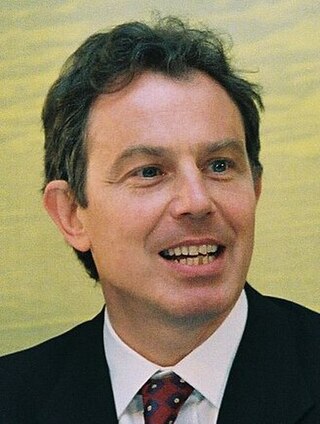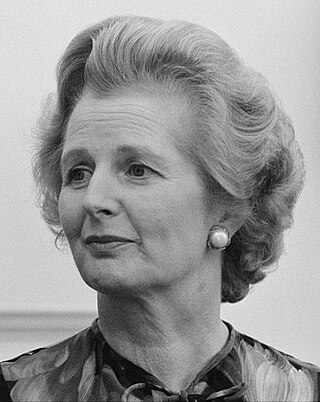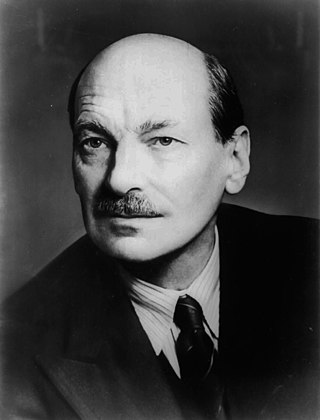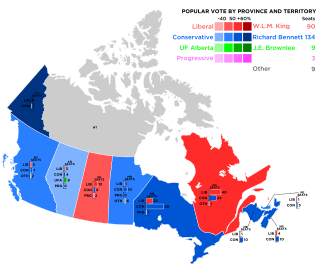Strategic or tactical voting is voting in consideration of possible ballots cast by other voters in order to maximize one's satisfaction with the election's results. For example, in plurality or instant-runoff, a voter may recognize their favorite candidate is unlikely to win and so instead support a candidate they think is more likely to win.

The 1997 United Kingdom general election was held on Thursday, 1 May 1997. The governing Conservative Party led by Prime Minister John Major was defeated in a landslide by the opposition Labour Party led by Tony Blair, achieving a 179-seat majority and a total of 419 seats.

The 1979 United Kingdom general election was held on Thursday 3 May 1979 to elect 635 members to the House of Commons. The election was held following the defeat of the Labour government in a no-confidence motion on 28 March 1979, six months before the Parliament was due for dissolution in October 1979.
BC United (BCU), known until 2023 as the British Columbia Liberal Party or BC Liberals, is a provincial political party in British Columbia, Canada. The party has been described as conservative, neoliberal, and being on the centre-right of the left–right political spectrum. The party commonly describes itself as a "free enterprise coalition" and draws support from members of both the federal Liberal and Conservative parties. Since the 1990s, BC United has been the main centre-right opposition to the centre-left New Democratic Party (NDP). Once affiliated with the Liberal Party of Canada, the British Columbia Liberal Party became independent in 1987. The party changed its name to BC United on April 12, 2023.

The American Independent Party (AIP) is a far-right political party in the United States that was established in 1967. The AIP is best known for its nomination of Democratic then-former Governor George Wallace of Alabama, who carried five states in the 1968 presidential election running on a populist, hard-line anti-Communist, pro-"law and order" platform, appealing to working-class white voters and widely understood by political analysts as having pro-segregationist or white supremacist undertones, against Richard Nixon and Hubert Humphrey. In 1976, the party split into the modern American Independent Party and the American Party. From 1992 until 2008, the party was the California affiliate of the national Constitution Party. Its exit from the Constitution Party led to a leadership dispute during the 2008 election.

The 1945 United Kingdom general election was a national election held on Thursday 5 July 1945, but polling in some constituencies was delayed by some days, and the counting of votes was delayed until 26 July to provide time for overseas votes to be brought to Britain. The governing Conservative Party sought to maintain its position in Parliament but faced challenges from public opinion about the future of the United Kingdom in the post-war period. Prime Minister Winston Churchill proposed to call for a general election in Parliament, which passed with a majority vote less than two months after the conclusion of the Second World War in Europe.

The Unionist Party was the main centre-right political party in Scotland between 1912 and 1965.

The British Columbia Unity Party was a political party in British Columbia, Canada. The party was founded as an attempted union of five conservative parties: the Reform Party of British Columbia, the British Columbia Social Credit Party, the British Columbia Conservative Party, the British Columbia Party, and the Family Coalition Party of British Columbia. Members from the first four parties joined with the Family Coalition Party to refound the Family Coalition Party as the BC Unity Party on January 10, 2001. The party was formed to present a united conservative option to voters in opposition to the centre-right BC Liberals and the centre-left New Democratic Party (NDP).
The Conservative Party of British Columbia, commonly the BC Conservatives and colloquially known as the Tories, is a provincial political party in British Columbia, Canada. In the first half of the twentieth century, the Conservatives competed with the BC Liberal Party for power in the province. However, the party's influence diminished in the second half of the century. The Tories had only a minor presence in the legislature after the 1950s, and last ran a full slate of candidates in 1960. The current party leader is Nechako Lakes MLA John Rustad, who was originally elected as a BC Liberal in 2005 before being expelled from the party in 2022.

The 1872 Canadian federal election was held from July 20 to October 12, 1872, to elect members of the House of Commons of Canada of the 2nd Parliament of Canada. Prime Minister Sir John A. Macdonald's Conservative Party remained in power, defeating the Liberals. However, the Liberals increased their parliamentary representation considerably, while the Conservative seat count remained static, giving them only six more seats than the Liberals. The election produced the country's first minority government. The support of two independent Conservative MPs functionally gave Macdonald an extremely slim majority that allowed it to survive for two years, until it fell due to scandal.

The 1945 Canadian federal election was held on June 11, 1945, to elect members of the House of Commons of the 20th Parliament of Canada. Prime Minister William Lyon Mackenzie King's Liberals won a third term. The party fell five seats short of a majority but was able to rule as a majority government with the support of Independent Liberal MPs.

The 1930 Canadian federal election was held on July 28, 1930, to elect members of the House of Commons of the 17th Parliament of Canada. Richard Bedford Bennett's Conservative Party won a majority government, defeating the Liberal Party led by Prime Minister William Lyon Mackenzie King.

The 2010 United Kingdom general election was held on Thursday 6 May 2010, to elect Members of Parliament to the House of Commons. The election took place in 650 constituencies across the United Kingdom under the first-past-the-post system. The election resulted in a large swing to the opposition Conservative Party led by David Cameron similar to that seen in 1979, the last time a Conservative opposition had ousted a Labour government. The governing Labour Party led by the prime minister Gordon Brown lost the 66-seat majority it had previously enjoyed, but no party achieved the 326 seats needed for a majority. The Conservatives won the most votes and seats, but still fell 20 seats short. This resulted in a hung parliament where no party was able to command a majority in the House of Commons. This was only the second general election since the Second World War to return a hung parliament, the first being the February 1974 election. This election marked the start of Conservative government for the next 14 years.
The New Jersey Conservative Party, formerly abbreviated as the NJCP, now as CP-NJ, is a conservative political party in New Jersey, United States.
Free Voters is a political party in Germany. It originates as an umbrella organisation of several Free Voters Associations, associations of people which participate in an election without having the status of a registered party. These associations are usually locally-organised groups of voters in the form of a registered association (eV). In most cases, Free Voters campaign only at local government level, standing for city councils and for mayoralties. Free Voters tend to achieve their most successful electoral results in rural areas of southern Germany, appealing most to conservative voters who prefer local decisions to party politics. Free Voter groups are active in all of the states of Germany.
The 1998 Wandsworth Council election took place on 7 May 1998 to elect members of Wandsworth London Borough Council in London, England. The whole council was up for election and the Conservative Party stayed in overall control of the council.

The 2002 St Albans City and District Council election took place on 2 May 2002 to elect members of St Albans District Council in Hertfordshire, England. One third of the council was up for election and the council stayed under no overall control.

The 2019 United Kingdom local elections took place on Thursday 2 May 2019, with 248 English local councils, six directly elected mayors in England, and all 11 local councils in Northern Ireland being contested.

Eric Dawson Duncan is a Canadian politician who was elected to represent the riding of Stormont—Dundas—South Glengarry in the House of Commons of Canada in the 2019 Canadian federal election. He is a member of the Conservative Party of Canada. Prior to his election to Parliament, Duncan served as mayor of the township of North Dundas from 2010 to 2018. He is the first Conservative MP to be elected as openly gay.

















